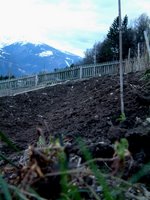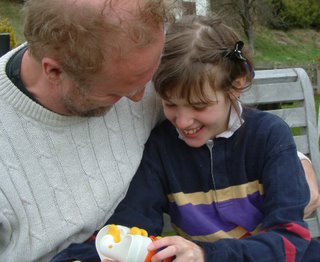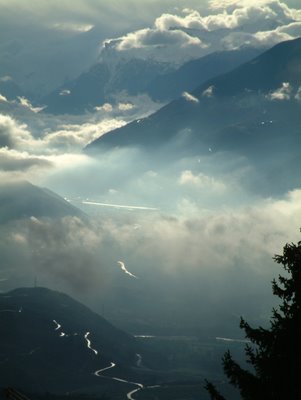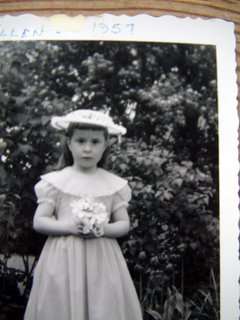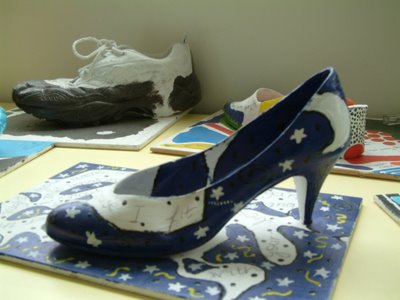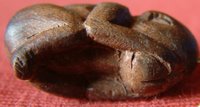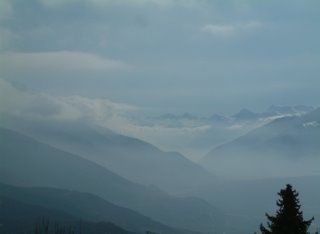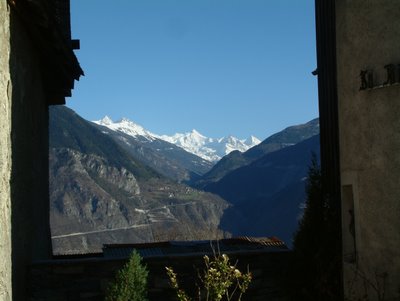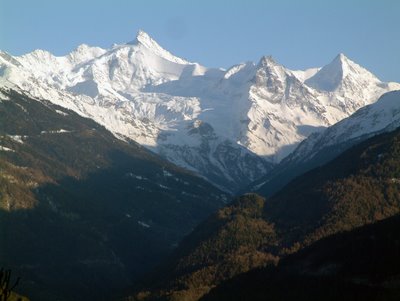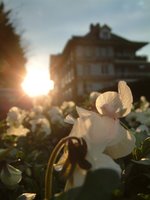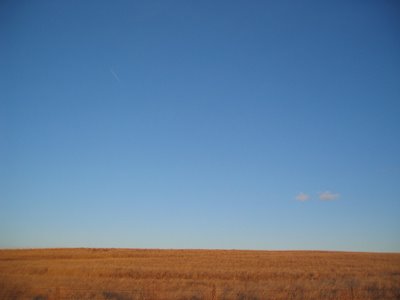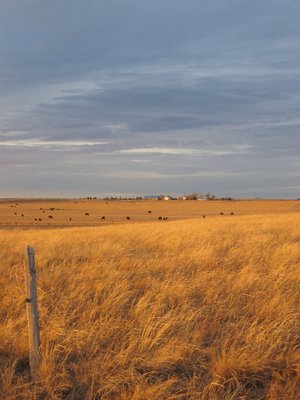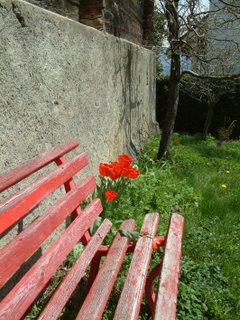
[printable version]
(part one is here)
"Francine," her older brother said one Sunday as the family, reduced to those left in Switzerland, melted raclette cheese over thick slabs of bread. The raclette had always been from their own cows. "The house will be very big for you."
Most of the family had by now moved away to seek a better life. Their father was dead and their mother, old and frail, was content to sit outside on a red bench, sipping a hot brew made from the Alpine flowers that grew around her.
“Why don’t we share it?” he continued. “The taxes are too high, because of that window Father put in the roof, and you don’t have work. “I don’t need much space – I will just take the small room with the window in the roof, and you can have the rest of the house, but we’ll split the cost. We’ll need to share the kitchen, of course.”
He was pleased with himself, for the offer was generous.
“I don’t think so,” Francine said dreamily, sipping her wine. “You’re welcome to come as often as you like, of course, but that room is my favorite place in the world.”
That was the beginning of the end of the smooth relations in the Alberghettini family, but Mother’s hearing rapidly faded and she continued to smile at her children, believing hers to be a happy family. Francine and Jean-Louis smiled back at her while muttering at each other, with increasing vehemence. The brothers and sisters who lived close enough to come for Sunday meals took sides.
Francine painted the room with the window to the sky a deep purple (“the better to feel the airiness of the mountain light”), which deeply offended Jean-Louis’s sense of Alpine simplicity. He in turn began to spend his days digging and hammering just outside the window, spoiling Francine’s sense of peace and quiet. He never offered to explain what he was doing and one day his sister had had enough.
“You could tell me what you’re doing.”
“It’s my property. You might recall I drew the stick for it.”
“Yes, but it’s my ears you’re ruining, and I would like to know why.”
He continued in stubborn silence.
Jean-Louis had an idea. His father had left him a small piece of land, useless because it was too small to build on. It was valuable in a way that only Marcel had seen, for the piece of land was no more than two scraps on either side of a river. His first son now began to dig holes for small rock pylons, and eventually the stone was put in place, piece by piece.
Francine stared at the strange columns rising a meter out of the ground and decided that Jean-Louis was mad, for he was spending the middle of his life building a very small bridge to nowhere, it seemed. She wondered if the strain of having so many younger brothers and sisters had been too much for him.
The floor of the “bridge” was laid, and then steadily, but slowly because he was working alone, four walls grew up from the floor. It was too large for a bridge.
“You’re building a small house!” said his mother one day, from her bench in the garden. She looked pleased with the idea. Francine was horrified, for the house looked as if it might block some of her view from her small window.
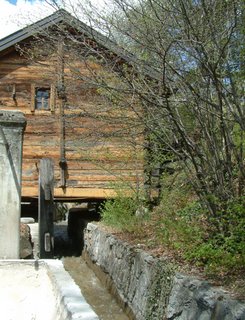 Jean-Louis spent the summer finishing his house, with precious days taken to build a window into the roof, a frame for his beautiful mountains. Francine stopped speaking to him the day it was clear that the roof would indeed now always be part of her view. She bought a new stereo system and put it in the small room at the top of her house and began to play classical music very loudly “so Mother can hear it,” she told her brothers and sisters. Those who said Mother was now completely deaf felt that Francine had lost her sense of proportion. The others, who felt Mother could still hear somewhat, felt that Francine should be given more credit, and wasn’t it a shame that Jean-Louis had ruined that view they had all loved as children?
Jean-Louis spent the summer finishing his house, with precious days taken to build a window into the roof, a frame for his beautiful mountains. Francine stopped speaking to him the day it was clear that the roof would indeed now always be part of her view. She bought a new stereo system and put it in the small room at the top of her house and began to play classical music very loudly “so Mother can hear it,” she told her brothers and sisters. Those who said Mother was now completely deaf felt that Francine had lost her sense of proportion. The others, who felt Mother could still hear somewhat, felt that Francine should be given more credit, and wasn’t it a shame that Jean-Louis had ruined that view they had all loved as children?
The only member of the family to avoid the window war was Martial, a peaceloving man who preferred to view the mountain from outside a house in any event. He had inherited a small hut in a high pasture, too far from civilization to have electricity or plumbing, and of little commercial value. He became an accountant because it promised a steady, quiet income and regular time off so he could go to his hut. He planted 10 flowers and tended them carefully. More, he felt, created obligations and he preferred a simple, uncluttered life. He graciously accepted, nevertheless, an offer from the commune to oversee some of its work.
For 20 years the window war raged and the family’s relations grew more acrimonious, while Mother grew increasingly deaf, and more silent. It was possible, the children conceded, that she could see the family was no longer happy. Fewer and fewer of them spoke to each other regularly and three of them began to drink more of the local Humagne blanc wine than they had in the past, so that when they did meet, words were often harsher than they might have been in sober moments.
Winter arrived and Mother Alberghettini fell sick and weakened rapidly. The children quietly drew near and waited for the end. Those who lived abroad came home. Mother was 84 and her children now ranged in age from 66 to 44.
It began to snow and snow. It snowed yet more, and everyone tried to think of a time when it had snowed this much. Mother Alberghettini appeared not to hear.
Her eyes suddenly opened wide.
“The window!”
Just as they looked from her to one another, puzzled, they heard a noise, as if a small train were running through the top of the house, and cold air rushed at them.
“Nooooo!” Francine screamed, rushing up the stairs. The others followed.
Indeed, the window had collapsed, and with it, most of the roof.
“Nooooo!” yelled Jean-Louis, for he suddenly realized that in the storm his own window to the sky and roof had caved in.
For the next two hours they rushed about trying to patch and plug the damage, to keep the wild mountain from the houses. Only Martial stayed where he was, holding his mother’s hand.
Martial was the only one sitting with her when she died, peacefully, with a small and slightly wicked smile on her face.
“You did the right thing,” she said to him.
That evening, the family talked, seesawing from quiet conversations and memories of Alberghettini, Marcel, the father, and his wife, to arguments about fixing the roof on the big house and the little bridge house.
“I will build my house higher this time,” said Francine in an ugly voice.
“So will I,” said Jean-Louis coldly.
“I don’t think so,” offered Martial. They all looked at him, for he rarely raised his voice over theirs.
“You see,” and he coughed shyly. “Last week I had the new planning guidelines approved by the commune and you can no longer have a roof in your window. For that matter, both of these houses are too high for the new standards, and you’ll have to put on lower, flatter roofs than you had before.”
No one said anything.
“The village felt that we needed to take measures to protect our heritage,” he said, sweeping his arm to take in the mountain commune. He looked at them all and then swept his arm in a smaller circle, one that took in just the family.
“Our heritage,” he repeated.




















